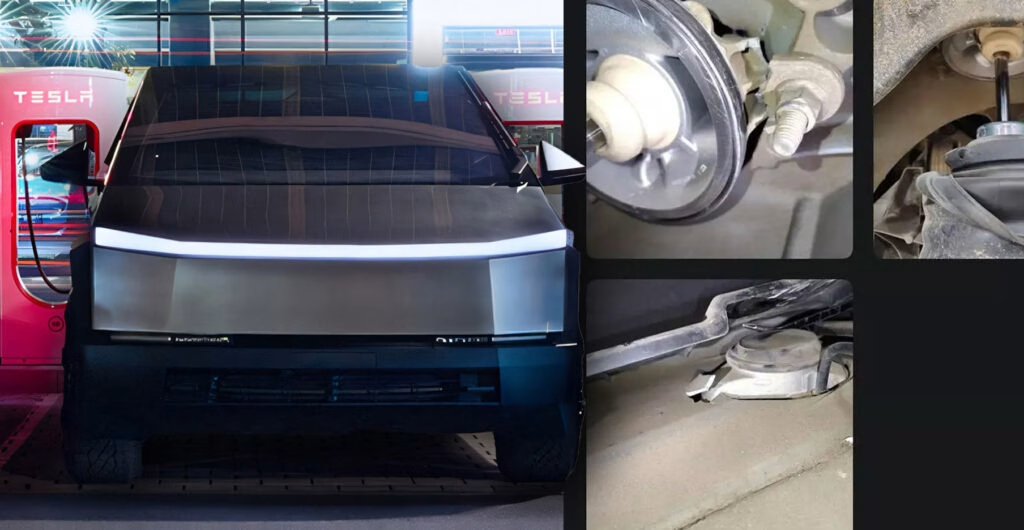What Caused a Tesla Cybertruck’s Suspension to Explode While Parked?
Imagine waking up to a loud bang in your driveway, only to find your brand-new Tesla Cybertruck sagging to one side, smoke or dust rising from the bed. That’s exactly what happened to a Texas owner, whose Cybertruck’s air suspension catastrophically failed after sitting idle for just 12 hours. No wild off-roading, no dramatic chase scene—just a parked truck, a mysterious explosion, and a heap of questions.
How Does Air Suspension Work, and Why Is It Used in Trucks Like the Cybertruck?
Air suspension systems have become increasingly popular in modern trucks and SUVs, and for good reason. Unlike traditional coil or leaf springs, air suspension uses pressurized air bags to support the vehicle’s weight. This allows for on-the-fly ride height adjustments—great for clearing obstacles off-road or lowering the truck for easier loading. The Cybertruck, with its futuristic design and off-road ambitions, comes standard with this tech.
But air suspension isn’t without its quirks. While it can deliver a smoother ride and more flexibility, it’s also more complex than steel springs. More moving parts means more potential failure points. According to a 2023 report from J.D. Power, air suspension systems are among the top five most common sources of mechanical complaints in luxury vehicles, especially in regions with extreme temperatures.
What Actually Happened to the Cybertruck’s Suspension?
The Texas owner described hearing a “shotgun-like bang” from outside his house. When he checked, the right side of his Cybertruck was visibly sagging. He hadn’t driven it for over half a day, and the truck was simply parked in the driveway. After towing it to a Tesla service center, technicians discovered that the shock and spring had punched straight through the frame, causing significant structural damage.
Tesla’s response? The company denied warranty coverage, citing “outside influence” as the cause. They even asked for $250 just to release the damaged vehicle back to the owner. That’s a tough pill to swallow, especially when you’re left with a repair bill and no clear explanation.
Could Texas Heat Be to Blame for the Suspension Failure?
Texas is notorious for its sweltering summers, with temperatures often soaring above 100°F (38°C). The Cybertruck owner speculated that the extreme heat might have caused the air suspension to fail. It’s not a far-fetched theory—heat can accelerate wear on rubber seals and plastic components, potentially leading to sudden failures.
However, experts point out that while heat can stress air suspension systems, a complete blowout that damages the frame is rare. According to the Society of Automotive Engineers (SAE), most air suspension failures due to temperature involve slow leaks or compressor issues, not explosive structural damage. So, while the Texas sun is brutal, it may not be the sole culprit here.
Did Previous Off-Roading Quietly Weaken the Suspension?
Some forum users suggested another possibility: hidden damage from previous off-road adventures. The owner admitted to taking his Cybertruck off the beaten path, and it’s possible that a rock or hard landing weakened the suspension components without any immediate symptoms. Over time, that damage could have worsened, finally giving way with a dramatic bang.
This isn’t unheard of. Off-roading can introduce stresses that aren’t always visible—bent brackets, hairline cracks, or compromised seals. If you’re pushing any vehicle, even one as tough-looking as the Cybertruck, it’s wise to inspect the suspension after each trip. What you don’t see can hurt you (or your wallet).
Why Did Tesla Refuse Warranty Coverage, and What Should Owners Know?
Tesla’s decision to deny warranty coverage left the owner frustrated and out of pocket. The company’s stance was that an “outside influence” caused the failure, which is a common catch-all in the automotive world for anything that might not be a clear-cut defect. Automakers often exclude damage from off-roading, collisions, or modifications from warranty claims.
For owners, this is a wake-up call. Always read the fine print on your warranty, especially if you plan to use your truck for rugged activities. Document your vehicle’s condition with photos, keep records of service and repairs, and don’t be afraid to push back if you believe a failure is due to a manufacturing fault. In some cases, involving a third-party mechanic or even a legal expert can help clarify your rights.
Are Air Suspension Failures Common in Electric Trucks?
While air suspension failures aren’t unheard of, catastrophic blowouts like this are rare. Most issues involve slow leaks, compressor malfunctions, or sensor errors—problems that usually give you warning signs before things go south. According to a 2024 reliability survey by Consumer Reports, less than 2% of electric truck owners reported major suspension failures in the first year of ownership, though minor issues were more common.
That said, the Cybertruck is still a relatively new model, and long-term data is limited. As more trucks hit the road (and trails), patterns will emerge. Until then, stories like this serve as cautionary tales for both owners and automakers.
What Can You Do to Protect Your Truck’s Suspension?
If you own a vehicle with air suspension—Cybertruck or otherwise—there are a few practical steps you can take:
– Park in the shade or a garage when possible to minimize heat exposure.
– Regularly inspect the suspension for leaks, cracks, or unusual sagging.
– After off-roading, check for visible damage or consult a professional.
– Listen for warning signs: hissing sounds, uneven ride height, or dashboard alerts.
– Keep up with software updates, as some issues can be fixed with improved calibration.
The big takeaway? Owning a high-tech truck like the Cybertruck isn’t about perfection—it’s about smarter adjustments. Start with one change this week, and you’ll likely spot the difference by month’s end.

